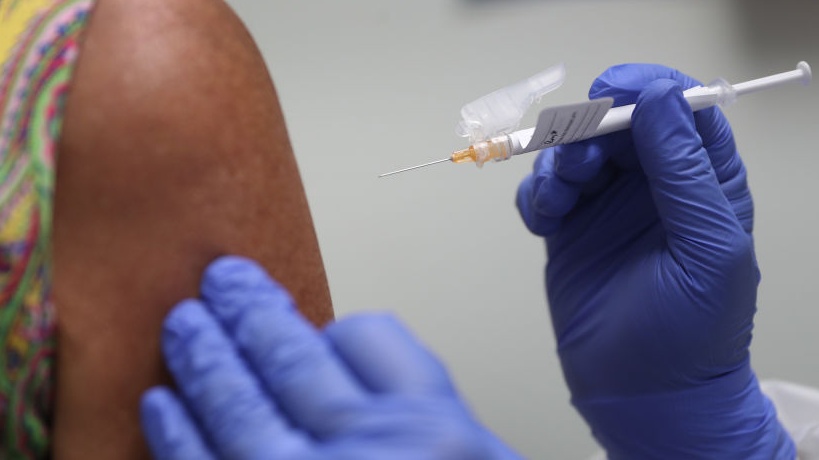On Tuesday, the FDA and CDC announced they are calling for the temporary halt of the Johnson & Johnson (J&J) vaccine following six reported cases of a rare and severe blood clot disorder “out of an abundance of caution.”
"Today FDA and @CDCgov issued a statement regarding the Johnson & Johnson #COVID19 vaccine," the FDA wrote in a tweet. "We are recommending a pause in the use of this vaccine out of an abundance of caution."
Today FDA and @CDCgov issued a statement regarding the Johnson & Johnson #COVID19 vaccine. We are recommending a pause in the use of this vaccine out of an abundance of caution.
— U.S. FDA (@US_FDA) April 13, 2021
The FDA said that six women between the ages of 18 and 48 developed symptoms of a disorder called cerebral venous sinus thrombosis six to 13 days after receiving the vaccination.
The FDA and CDC joint statement addressed the blood clotting disorder which can cause hemorrhaging in the brain, according to Johns Hopkins Medicine.
"In these cases, a type of blood clot called cerebral venous sinus thrombosis (CVST) was seen in combination with low levels of blood platelets (thrombocytopenia)," the statement read. "Treatment of this specific type of blood clot is different from the treatment that might typically be administered. Usually, an anticoagulant drug called heparin is used to treat blood clots. In this setting, administration of heparin may be dangerous, and alternative treatments need to be given."
More than 6.8 million doses of the single-dose COVID-19 vaccine have been administered in the United States. The FDA and CDC said that they will continue to review the cases.
"[The] CDC will convene a meeting of the Advisory Committee on Immunization Practices (ACIP) on Wednesday to further review these cases and assess their potential significance," the statement reads. "[The] FDA will review that analysis as it also investigates these cases. Until that process is complete, we are recommending a pause in the use of this vaccine out of an abundance of caution. This is important, in part, to ensure that the health care provider community is aware of the potential for these adverse events and can plan for proper recognition and management due to the unique treatment required with this type of blood clot."
Johnson & Johnson also issued their own statement in response to the blood clotting allegations.
"The safety and well-being of the people who use our products is our number one priority. We share all adverse event reports about individuals receiving our COVID-19 vaccine, along with our assessment of these reports, with health authorities in compliance with regulatory standards," the Johnson & Johnson statement reads. "We are aware that thromboembolic events including those with thrombocytopenia have been reported with COVID-19 vaccines. At present, no clear causal relationship has been established between these rare events and the Janssen COVID-19 vaccine. We continue to work closely with experts and regulators to assess the data and support the open communication of this information to healthcare professionals and the public."
Both the CDC and FDA noted in their statement that the reported adverse events to the vaccine are “extremely rare.”
Dr. Carlos del Rio, executive associate dean of the Emory University School of Medicine at Grady Health System, claimed that the side effect is one in a million.
"It's a very rare event,” he said, according to CNN. “You're talking about 1 per million, and when you give millions of doses of vaccines, you will see events like this that you couldn't see in the clinical trial just because you didn't have millions of people enrolled.”
Due to Johnson & Johnson’s convenience of a one-time shot, the vaccine was positioned to be distributed in less accessible populations, such as those experiencing homelessness, or people navigating through the criminal justice system.
Just last week, The Wall Street Journal reported that the Johnson & Johnson vaccine is the “preferred shot for the homeless,” claiming that it provides “an advantage in serving transient people who are difficult to find for second jabs.”
Officials have discussed concerns of deepening racial and economic disparities over the vaccine's rollout as its distribution has been seen in low-income and disadvantaged communities.
“If we end up with a hierarchy that says all rich White people get Pfizer, and all poor Black people get J&J, that would be a problem,” Helene D. Gayle, president and chief executive of the Chicago Community Trust, one of the most prominent community foundations in the country, said, according to The Washington Post.
Though millions of doses of the vaccine have already been administered, the FDA and CDC statement advised what to do in the event that there are side effects within three weeks of having received the J&J vaccine.
“People who have received the J&J vaccine who develop severe headache, abdominal pain, leg pain, or shortness of breath within three weeks after vaccination should contact their health care provider,” the joint statement reads. “Health care providers are asked to report adverse events to the Vaccine Adverse Event Reporting System at https://vaers.hhs.gov/reportevent.html.”
